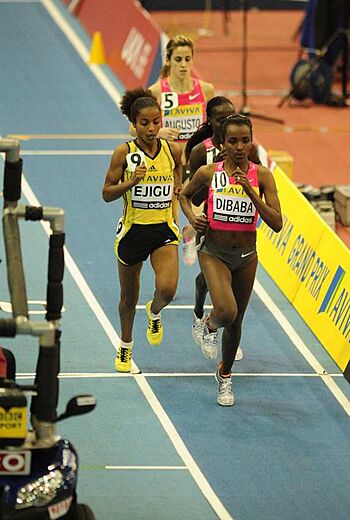3000 metres facts for kids
Quick facts for kids Athletics3000 metres |
|
|---|---|

A women's indoor 3000 m race in Birmingham featuring Sentayehu Ejigu and Tirunesh Dibaba.
|
|
| World records | |
| Men | |
| Women | |
| Short track world records | |
| Men | |
| Women | |
| World junior (U20) records | |
| Men | |
| Women | |
The 3000 metres is a track running event. It is also called the "3K" or "3K run". In this race, athletes run 7.5 laps on a standard outdoor track. An outdoor track is usually 400 metres long. If the race is held indoors, athletes run 15 laps on a 200-metre indoor track.
This event is a mix of speed and endurance. Some people think it's a middle-distance race. Others say it's a long-distance race. Runners need to be fast like in a mile race. But they also need the stamina for longer races like the 5000 metres. To run the 3000 metres well, athletes must have strong aerobic endurance. This means their bodies are good at using oxygen for energy. They also need to handle lactic acid build-up. Lactic acid can make muscles feel tired and sore.
Contents
History of the 3000 Metres
The 3000 metres has a cool history in big sports events.
Men's Races
For men, the 3000 metres was an Olympic event a long time ago. It was a team race in 1912, 1920, and 1924. But it hasn't been in the Olympics since then. It's not usually part of the main outdoor IAAF championships either. However, you can often see it in indoor track and field events. It's the longest race at the IAAF World Indoor Championships.
Women's Races
For women, the 3000 metres was a regular event in the Olympic Games. It was included from 1984 to 1992. It was also in the World Championships from 1980 to 1993. After the 1993 World Championships in Athletics, the event changed. The 3000 metres was replaced by the 5000 metres race. This change happened for the 1995 World Championships in Athletics and the 1996 Olympic Games.
World Records
Athletes who are really good at the 3000 metres run very fast. They push their bodies to the limit.
The men's outdoor world record is 7 minutes and 20.67 seconds. Daniel Komen from Kenya set this record in 1996. The men's indoor world record is 7 minutes and 23.81 seconds. Lamecha Girma from Ethiopia set this in 2023.
The women's outdoor world record is 8 minutes and 6.11 seconds. Wang Junxia from China set this in 1993. The women's indoor world record is 8 minutes and 16.60 seconds. Genzebe Dibaba from Ethiopia set this in 2014.
Medal Winners
Many amazing athletes have won medals in the 3000 metres.
Women's Olympic Medalists
| Games | Gold | Silver | Bronze |
|---|---|---|---|
| 1984 Los Angeles |
Maricica Puică |
Wendy Smith-Sly |
Lynn Williams |
| 1988 Seoul |
Tetyana Samolenko |
Paula Ivan |
Yvonne Murray |
| 1992 Barcelona |
Yelena Romanova |
Tetyana Dorovskikh |
Angela Chalmers |
Women's World Championships Medalists
| Championships | Gold | Silver | Bronze |
|---|---|---|---|
| 1980 Sittard |
|||
| 1983 Helsinki |
|||
| 1987 Rome |
|||
| 1991 Tokyo |
|||
| 1993 Stuttgart |
Men's World Indoor Championships Medalists
| Games | Gold | Silver | Bronze |
|---|---|---|---|
| 1985 Paris | |||
| 1987 Indianapolis |
|||
| 1989 Budapest |
|||
| 1991 Seville |
|||
| 1993 Toronto |
|||
| 1995 Barcelona |
|||
| 1997 Paris |
|||
| 1999 Maebashi |
|||
| 2001 Lisbon |
|||
| 2003 Birmingham |
|||
| 2004 Budapest |
|||
| 2006 Moscow |
|||
| 2008 Valencia |
|||
| 2010 Doha |
|||
| 2012 Istanbul |
|||
| 2014 Sopot |
|||
| 2016 Portland |
|||
| 2018 Birmingham |
|||
| 2022 Belgrade |
|||
| 2024 Glasgow |
Women's World Indoor Championships Medalists
| Games | Gold | Silver | Bronze |
|---|---|---|---|
| 1985 Paris | |||
| 1987 Indianapolis |
|||
| 1989 Budapest |
|||
| 1991 Seville |
|||
| 1993 Toronto |
|||
| 1995 Barcelona |
|||
| 1997 Paris |
|||
| 1999 Maebashi |
|||
| 2001 Lisbon |
|||
| 2003 Birmingham |
|||
| 2004 Budapest |
|||
| 2006 Moscow |
|||
| 2008 Valencia |
|||
| 2010 Doha |
|||
| 2012 Istanbul |
|||
| 2014 Sopot |
|||
| 2016 Portland |
|||
| 2018 Birmingham |
|||
| 2022 Belgrade |
|||
| 2024 Glasgow |
- Known as the World Indoor Games

